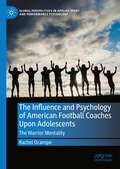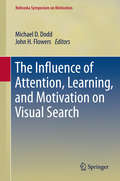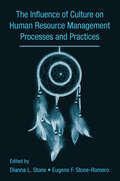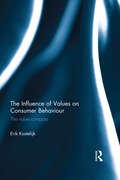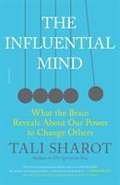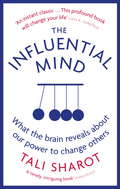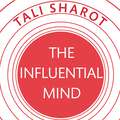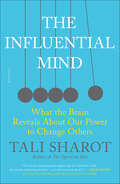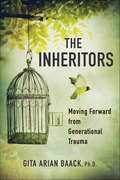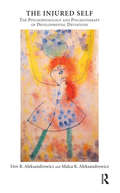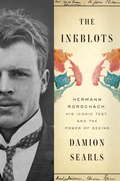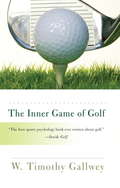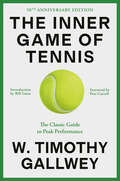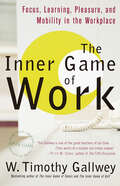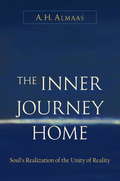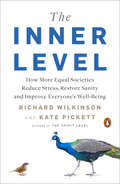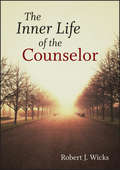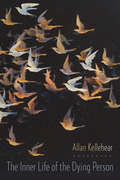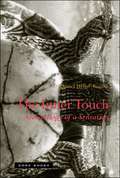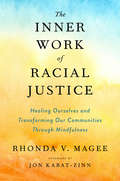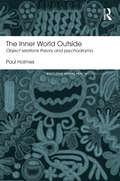- Table View
- List View
The Influence and Psychology of American Football Coaches Upon Adolescents: The Warrior Mentality (Global Perspectives in Applied Sport and Performance Psychology)
by Rachel OcampoThis book details the psychological theory and research surrounding various aspects of coaching, with a specific focus on American football coaches' work with young people. These theories are explained using coaches' personal stories and the clinical insights of the author: a former athlete, sport psychology professor, and licensed psychologist. This book explores the psychological minutiae of effective coaching relationships, avenues toward expanding notions of traditional masculinity, ethnic and racial minority worldviews and experiences in sport, ways to more effectively engage gender and sexual minority athletes and players living in poverty, strategies to meet the needs of neurodiverse and physically or intellectually challenged players, recommendations for balancing coaches' role strain, and ways to weather mental health challenges surrounding grief and loss on and off the field. In addition, this book also infuses global perspectives on applied sport psychology in its focus on American football coaches from immigrant, indigenous, and non-Western backgrounds. Experiences of these coaches will be explored to better understand specific struggles, strengths, and contributions of these communities to the field of sport psychology.
The Influence of Attention, Learning, and Motivation on Visual Search
by John Flowers Michael D. DoddThe Influence of Attention, Learning, and Motivation on Visual Search will bring together distinguished authors who are conducting cutting edge research on the many factors that influence search behavior. These factors will include low-level feature detection; statistical learning; scene perception; neural mechanisms of attention; and applied research in real world settings.
The Influence of Culture on Human Resource Management Processes and Practices (Applied Psychology Ser.)
by Dianna L. Stone Eugene F. Stone-RomeroIt is clear that organizations are becoming more culturally diverse, and a better understanding of multiculturism and its impact on organizations is needed. This book, with contributions from expert academics, is designed to motivate both the further development of models concerned with the influence of cultural diversity on several Human Resource
The Influence of Culture on Human Resource Management Processes and Practices (Applied Psychology Series)
by Dianna L. Stone Eugene F. Stone-RomeroThis book, with contributions from expert academics, is designed to motivate both the further development of models concerned with the influence of cultural diversity on several human resource management processes and practices and the design and conduct of empirical research on the same topic.
The Influence of Values on Consumer Behaviour: The value compass
by Erik KostelijkSubstantial progress has been made in the conceptualization of values within psychology. The importance of values is also acknowledged in marketing, and companies use values to describe the core associations of their brand. Yet despite this, the values concept has received limited attention in marketing theory. The Influence of Values on Consumer Behaviour aims to bridge the gap between the conceptual progress of values in psychology, and the current practice in marketing and branding literature. It proposes the ‘Value Compass’, a comprehensive value system that is cross-culturally applicable to consumer behaviour and brand choice. The values concept is used in psychology to identify the motivations underlying behaviour, a concept that marketers have borrowed to define brand values. This has led to conceptual confusion. Whereas in psychology the values system is perceived as an integrated structure, in marketing, values are treated as abstract motivations that give importance to the benefits of consumption. Attention in marketing has shifted away from brand values toward brand personality, a set of human characteristics associated with a brand. Despite its popularity, brand personality has limitations in explaining consumer behaviour, while the potential merits of a brand values concept have remained largely unexplored. The book presents a meaningful alternative to the brand personality concept and promotes the benefits of using the Value Compass for assessing the effects of brand values and personal values on consumer choice. As such, it will be essential reading for academics and postgraduate students in the fields of marketing, consumer psychology, branding, consumer choice behaviour and business studies.
The Influential Mind: What the Brain Reveals About Our Power to Change Others
by Tali SharotA cutting-edge, research-based inquiry into how we influence those around us, and how understanding the brain can help us change minds for the better. <P><P> In The Influential Mind, neuroscientist Tali Sharot takes us on a thrilling exploration of the nature of influence. We all have a duty to affect others—from the classroom to the boardroom to social media. But how skilled are we at this role, and can we become better? It turns out that many of our instincts—from relying on facts and figures to shape opinions, to insisting others are wrong or attempting to exert control—are ineffective, because they are incompatible with how people’s minds operate. Sharot shows us how to avoid these pitfalls, and how an attempt to change beliefs and actions is successful when it is well-matched with the core elements that govern the human brain. <P><P> Sharot reveals the critical role of emotion in influence, the weakness of data and the power of curiosity. Relying on the latest research in neuroscience, behavioral economics, and psychology, the book provides fascinating insight into the complex power of influence, good and bad.
The Influential Mind: What the Brain Reveals About Our Power to Change Others
by Tali SharotSelected as a best book of 2017 by Forbes, The Times, Huffington Post, Bloomberg, Greater Good Magazine, Stanford Business School and more.'A timely, intriguing book' Adam Grant, New York Times bestselling author of Originals and Give and Take'This profound book will change your life. An instant classic' Cass R. Sunstein, bestselling co-author of NudgePart of our daily job as humans is to influence others; we teach our children, guide our patients, advise our clients, help our friends and inform our online followers. We do this because we each have unique experiences and knowledge that others may not. But how good are we at this role? It turns out we systematically fall back on suboptimal habits when trying to change other's beliefs and behaviors. Many of these instincts-from trying to scare people into action, to insisting the other is wrong or attempting to exert control-are ineffective, because they are incompatible with how the mind operates.
The Influential Mind: What the Brain Reveals About Our Power to Change Others
by Tali SharotThis audio edition includes an accompanying PDF to refer to alongside the audiobook.A cutting-edge, research-based inquiry into how we influence those around us, and how understanding the brain can help us change minds for the better.Part of our daily job as humans is to influence others; we teach our children, guide our patients, advise our clients, help our friends and inform our online followers. We do this because we each have unique experiences and knowledge that others may not. But how good are we at this role? It turns out we systematically fall back on suboptimal habits when trying to change other's beliefs and behaviors. Many of these instincts-from trying to scare people into action, to insisting the other is wrong or attempting to exert control-are ineffective, because they are incompatible with how the mind operates. The principle idea of this book is that an attempt to change will be successful if it is well-matched with the core elements that govern how our brain works. Sharot unveils the hidden power of influence, good and bad, and enables us to identify instances in which we fall prey to delusions. The book will search deep below the surface-relying on the latest research in neuroscience and psychology-to provide new insight into human behavior.
The Influential Mind: What the Brain Reveals About Our Power to Change Others
by Tali SharotA cutting-edge, research-based inquiry into how we influence those around us and how understanding the brain can help us change minds for the better.In The Influential Mind, neuroscientist Tali Sharot takes us on a thrilling exploration of the nature of influence. We all have a duty to affect others—from the classroom to the boardroom to social media. But how skilled are we at this role, and can we become better? It turns out that many of our instincts—from relying on facts and figures to shape opinions, to insisting others are wrong or attempting to exert control—are ineffective, because they are incompatible with how people’s minds operate. Sharot shows us how to avoid these pitfalls, and how an attempt to change beliefs and actions is successful when it is well-matched with the core elements that govern the human brain.Sharot reveals the critical role of emotion in influence, the weakness of data and the power of curiosity. Relying on the latest research in neuroscience, behavioral economics and psychology, the book provides fascinating insight into the complex power of influence, good and bad.Praise for The Influential MindWinner of the 2018 British Psychological Society Book AwardSelected as a Best Book of 2017 by Forbes, The Times (UK), The Huffington Post, Bloomberg, Greater Good Magazine, Inc., Stanford Business School,and more“Sharot . . . covers the topic more fully and more authoritatively in a book whose title gives appropriately equal billing to thought, behavior and neurons. . . . Her book is a witty survey of techniques to influence and guide human behavior.” —The New York Times Book Review“This timely, intriguing book explains why it’s so difficult to shift the attitudes and actions of others—and what we can do about it.” —Adam Grant, New York Times–bestselling author of Originals and Give and Take
The Inheritors: Moving Forward from Generational Trauma
by Gita Arian BaackOur family legacies, both positive and negative, are passed down from one generation to the next in ways that are not fully understood. This secondary form of trauma, which Gita Baack calls “Inherited Trauma,” has not received adequate attention—a failing that perpetuates cycles of pain, hatred, and violence. In The Inheritors, readers are given the opportunity to reflect on the inherited burdens they carry, as well as the resilience that has given them the power of survival. Through engaging stories and unique concepts, readers will learn new ways to explore the unknowns in their legacies, reflect on questions that are posed at the end of each chapter, and begin to write their own story.
The Injured Self: The Psychopathology and Psychotherapy of Developmental Deviations
by Dov R. AleksandrowiczThis book examines the clinical implications of innate developmental individuality. The authors present a model of what they call “developmentally informed” therapy, based on the assumption that biologically determined (or co-determined) maladjusted behaviours and deficiencies of ego functions cannot be resolved by interpretation of an unconscious conflict, but need to be “validated”, analysed, and integrated with the personality. Several clinical case histories illustrate the authors’ approach. The case presentations are followed by a discussion of counselling parents of children with developmental deviations. The authors also discuss the theoretical issues that arise from this and the role of cognition, especially learning, in the therapeutic relationship and the therapeutic process. Finally, the authors present some recent advances in neuro-behavioural sciences which appear relevant to the issues discussed in the book, and close with a concluding discussion.
The Inkblots: Hermann Rorschach, His Iconic Test, and the Power of Seeing
by Damion SearlsThe captivating, untold story of Hermann Rorschach and his famous inkblot test In 1917, working alone in a remote Swiss asylum, psychiatrist Hermann Rorschach devised an experiment to probe the human mind: a set of ten carefully designed inkblots. For years he had grappled with the theories of Freud and Jung while also absorbing the aesthetic movements of the day, from Futurism to Dadaism. A visual artist himself, Rorschach had come to believe that who we are is less a matter of what we say, as Freud thought, than what we see.After Rorschach’s early death, his test quickly made its way to America, where it took on a life of its own. Co-opted by the military after Pearl Harbor, it was a fixture at the Nuremberg trials and in the jungles of Vietnam. It became an advertising staple, a cliché in Hollywood and journalism, and an inspiration to everyone from Andy Warhol to Jay Z. The test was also given to millions of defendants, job applicants, parents in custody battles, and people suffering from mental illness or simply trying to understand themselves better. And it is still used today.In this first-ever biography of Rorschach, Damion Searls draws on unpublished letters and diaries and a cache of previously unknown interviews with Rorschach’s family, friends, and colleagues to tell the unlikely story of the test’s creation, its controversial reinvention, and its remarkable endurance—and what it all reveals about the power of perception. Elegant and original, The Inkblots shines a light on the twentieth century’s most visionary synthesis of art and science.
The Inner Game Of Golf
by W. Timothy GallweyW. Timothy Gallwey's bestselling Inner Game books--with over one million copies sold--have revolutionized the way we think about sports. And now, after twenty years of applying his Inner Game methods to the royal and ancient sport of golf, Gallwey brings us this completely revised edition of his classic The Inner Game of Golf, nearly half of which is new material, published here for the first time. Even the masters of the game, from the venerable Jack Nicklaus to the wunderkind Tiger Woods, must battle their mental demons to excel in the crucible of competition. How do they maintain concentration under pressure? How do they avoid the mental and physical tensions that can sabotage any shot, from the simplest putt to a demanding drive? And how do they contend with the nagging inner voice that says, "You haven't been playing your best today. How will you keep from messing up on this shot?" Here, Gallwey provides specific ways for you to improve the concentration and confidence that keep your insecurities from hijacking your best instincts, your score, and your enjoyment of the game. In addition to the specifics of Inner chipping, Inner swinging, and Inner putting, Gallwey explains why the art of "relaxed concentration" is the fundamental skill for improving every aspect of your game. It may seem like common sense nowadays to say that mental approaches are as crucial as physical skills in a good game of golf. But Gallwey was among the first to say it, and he is a pioneer of the modern sports psychology movement. In The Inner Game of Golf, now comprehensively updated, you will find the kind of perceptive and articulate instruction that not only will improve your swing, but, perhaps even more important, will reacquaint you with the pure pleasure of the game.
The Inner Game of Tennis: The Classic Guide to the Mental Side of Peak Performance
by W. Timothy GallweyThe timeless guide to achieving the state of &“relaxed concentration&” that&’s not only the key to peak performance in tennis but the secret to success in life itself—part of the bestselling Inner Game series, with more than one million copies sold!&“Groundbreaking . . . the best guide to getting out of your own way . . . Its profound advice applies to many other parts of life.&”—Bill Gates, GatesNotes (&“Five of My All-Time Favorite Books&”) This phenomenally successful guide to mastering the game from the inside out has become a touchstone for hundreds of thousands of people. Billie Jean King has called the book her tennis bible; Al Gore has used it to focus his campaign staff; and Itzhak Perlman has recommended it to young violinists. Based on W. Timothy Gallwey&’s profound realization that the key to success doesn&’t lie in holding the racket just right, or positioning the feet perfectly, but rather in keeping the mind uncluttered, this transformative book gives you the tools to unlock the potential that you&’ve possessed all along. &“The Inner Game&” is the one played within the mind of the player, against the hurdles of self-doubt, nervousness, and lapses in concentration. Gallwey shows us how to overcome these obstacles by trusting the intuitive wisdom of our bodies and achieving a state of &“relaxed concentration.&” With chapters devoted to trusting the self and changing habits, it is no surprise then, that Gallwey&’s method has had an impact far beyond the confines of the tennis court. Whether you want to play music, write a novel, get ahead at work, or simply unwind after a stressful day, Gallwey shows you how to tap into your utmost potential. No matter your goals, The Inner Game of Tennis gives you the definitive framework for long-term success.
The Inner Game of Work: Focus, Learning, Pleasure, and Mobility in the Workplace
by W. Timothy GallweyDo you think it's possible to truly enjoy your job? No matter what it is or where you are? Timothy Gallwey does, and in this groundbreaking book he tells you how to overcome the inner obstacles that sabotage your efforts to be your best on the job. Timothy Gallwey burst upon the scene twenty years ago with his revolutionary approach to excellence in sports. His bestselling books The Inner Game of Tennis and The Inner Game of Golf, with over one million copies in print, changed the way we think about learning and coaching. But the Inner Game that Gallwey discovered on the tennis court is about more than learning a better backhand; it is about learning how to learn, a critical skill that, in this case, separates the productive, satisfied employee from the rest of the pack. For the past twenty years Gallwey has taken his Inner Game expertise to many of America's top companies, including AT&T, Coca-Cola, Apple, and IBM, to teach their managers and employees how to gain better access to their own internal resources. What inner obstacles is Gallwey talking about? Fear of failure, resistance to change, procrastination, stagnation, doubt, and boredom, to name a few. Gallwey shows you how to tap into your natural potential for learning, performance, and enjoyment so that any job, no matter how long you've been doing it or how little you think there is to learn about it, can become an opportunity to sharpen skills, increase pleasure, and heighten awareness. And if your work environment has been turned on its ear by Internet technology, reorganization, and rapidly accelerating change, this book offers a way to steer a confident course while navigating your way toward personal and professional goals. The Inner Game of Workteaches you the difference between a rote performance and a rewarding one. It teaches you how to stop working in the conformity mode and start working in the mobility mode. It shows how having a great coach can make as much difference in the boardroom as on the basketball court-- and Gallwey teaches you how to find that coach and, equally important, how to become one. The Inner Game of Work challenges you to reexamine your fundamental motivations for going to work in the morning and your definitions of work once you're there. It will ask you to reassess the way you make changes and teach you to look at work in a radically new way. "Ever sinceThe Inner Game of Tennis, I've been fascinated and have personally benefitted by the incredibly empowering insights flowing out of Gallwey's self-one/self-two analysis. This latest book applies this liberating analogy to work inspiring all of us to relax and trust our true self. " --Stephen R. Covey, author of7 Habits of Highly Effective People
The Inner Journey Home: The Soul's Realization of the Unity of Reality
by A. H. AlmaasWhat is the soul, and how do we come to know it? What is its journey in life, and what stages and obstacles are encountered along the way? These questions are explored here in detail according to the Diamond Approach, a spiritual path that combines systematic inquiry into personal experience, the practice of traditional spiritual methods, and the application of modern psychological research. The Inner Journey Home is the centerpiece of the Diamond Approach literature, providing a complete overview of the teaching with references to the author's other books for more details on certain topics.
The Inner Level: How More Equal Societies Reduce Stress, Restore Sanity and Improve Everyone's Well-Being
by Kate Pickett Richard WilkinsonA groundbreaking investigation of how inequality infects our minds and gets under our skinWhy are people more relaxed and at ease with each other in some countries than others? Why do we worry so much about what others think of us and often feel social life is a stressful performance? Why is mental illness three times as common in the USA as in Germany? Why is the American dream more of a reality in Denmark than the USA? What makes child well-being so much worse in some countries than others? As The Inner Level demonstrates, the answer to all these is inequality. In The Spirit Level Richard Wilkinson and Kate Pickett put inequality at the center of public debate by showing conclusively that less equal societies fare worse than more equal ones across everything from education to life expectancy. The Inner Level now explains how inequality affects us individually, altering how we think, feel and behave. It sets out the overwhelming evidence that material inequities have powerful psychological effects: when the gap between rich and poor increases, so does the tendency to define and value ourselves and others in terms of superiority and inferiority. A deep well of data and analysis is drawn upon to empirically show, for example, that low social status leads to elevated levels of stress hormones, and how rates of anxiety, depression and addictions are intimately related to the inequality which makes that status paramount. Wilkinson and Pickett describe how these responses to hierarchies evolved, and why the impacts of inequality on us are so severe. In doing so, they challenge the conception that humans are inescapably competitive and self-interested. They undermine, too, the idea that inequality is the product of "natural" differences in individual ability. This book draws together many of the most urgent problems facing societies today, but it is not just an index of our ills. It demonstrates that societies based on fundamental equalities, sharing and reciprocity generate much higher levels of well-being, and lays out the path towards them.
The Inner Life of the Counselor
by Robert J. WicksOne of the greatest gifts helping professionals can share with others is a sense of their own peace. However, retaining and renewing a sense of a healthy perspective requires not only self-care strategies, but also an awareness of basic profound, yet simple, wisdom themes. The Inner Life of the Counselor presents classic and contemporary wisdom that examines and explores each of these themes in a way that both professional and non-professional helpers will find revealing and meaningful in understanding their own journey. Informed by the author's over thirty years of experience as a therapist, mentor, and clinical supervisor of professional helpers?as well as by his expertise in resiliency and prevention of secondary stress?The Inner Life of the Counselor thoughtfully looks at those elements that encourage sustained personal growth and professional development, such as self-care, stress management, and mindfulness. Lively, practical, and marked by an elegant sense of simplicity, this nurturing book demonstrates how exploring the inner life can lead counselors to new wisdom and inner peace?not only for themselves but also for those who come to them for relief and insight. It is an invitation to pause, reflect, renew, and navigate one of contemporary society's most challenging yet rewarding professions.
The Inner Life of the Dying Person
by Allan KellehearThis unique book recounts the experience of facing one's death solely from the dying person's point of view rather than from the perspective of caregivers, survivors, or rescuers. Such unmediated access challenges assumptions about the emotional and spiritual dimensions of dying, showing readers that -- along with suffering, loss, anger, sadness, and fear -- we can also feel courage, love, hope, reminiscence, transcendence, transformation, and even happiness as we die.A work that is at once psychological, sociological, and philosophical, this book brings together testimonies of those dying from terminal illness, old age, sudden injury or trauma, acts of war, and the consequences of natural disasters and terrorism. It also includes statements from individuals who are on death row, in death camps, or planning suicide. Each form of dying addressed highlights an important set of emotions and narratives that often eclipses stereotypical renderings of dying and reflects the numerous contexts in which this journey can occur outside of hospitals, nursing homes, and hospices. Chapters focus on common emotional themes linked to dying, expanding and challenging them through first-person accounts and analyses of relevant academic and clinical literature in psycho-oncology, palliative care, gerontology, military history, anthropology, sociology, cultural and religious studies, poetry, and fiction. The result is an all-encompassing investigation into an experience that will eventually include us all and is more surprising and profound than anyone can imagine.
The Inner Life of the Dying Person
by Allan KellehearThis unique book recounts the experience of facing one's death solely from the dying person's point of view rather than from the perspective of caregivers, survivors, or rescuers. Such unmediated access challenges assumptions about the emotional and spiritual dimensions of dying, showing readers that -- along with suffering, loss, anger, sadness, and fear -- we can also feel courage, love, hope, reminiscence, transcendence, transformation, and even happiness as we die.A work that is at once psychological, sociological, and philosophical, this book brings together testimonies of those dying from terminal illness, old age, sudden injury or trauma, acts of war, and the consequences of natural disasters and terrorism. It also includes statements from individuals who are on death row, in death camps, or planning suicide. Each form of dying addressed highlights an important set of emotions and narratives that often eclipses stereotypical renderings of dying and reflects the numerous contexts in which this journey can occur outside of hospitals, nursing homes, and hospices. Chapters focus on common emotional themes linked to dying, expanding and challenging them through first-person accounts and analyses of relevant academic and clinical literature in psycho-oncology, palliative care, gerontology, military history, anthropology, sociology, cultural and religious studies, poetry, and fiction. The result is an all-encompassing investigation into an experience that will eventually include us all and is more surprising and profound than anyone can imagine.
The Inner Life of the Dying Person (End-of-Life Care: A Series)
by Allan KellehearThis unique book recounts the experience of facing one's death solely from the dying person's point of view rather than from the perspective of caregivers, survivors, or rescuers. Such unmediated access challenges assumptions about the emotional and spiritual dimensions of dying, showing readers that—along with suffering, loss, anger, sadness, and fear—we can also feel courage, love, hope, reminiscence, transcendence, transformation, and even happiness as we die. A work that is at once psychological, sociological, and philosophical, this book brings together testimonies of those dying from terminal illness, old age, sudden injury or trauma, acts of war, and the consequences of natural disasters and terrorism. It also includes statements from individuals who are on death row, in death camps, or planning suicide. Each form of dying addressed highlights an important set of emotions and narratives that often eclipses stereotypical renderings of dying and reflects the numerous contexts in which this journey can occur outside of hospitals, nursing homes, and hospices. Chapters focus on common emotional themes linked to dying, expanding and challenging them through first-person accounts and analyses of relevant academic and clinical literature in psycho-oncology, palliative care, gerontology, military history, anthropology, sociology, cultural and religious studies, poetry, and fiction. The result is an all-encompassing investigation into an experience that will eventually include us all and is more surprising and profound than anyone can imagine.
The Inner Touch: Archaeology Of A Sensation
by Daniel Heller-RoazenThe Inner Touch presents the archaeology of a single sense: the sense of being sentient. Aristotle was perhaps the first to define this faculty when in his treatise On the Soul he identified a sensory power, irreducible to the five senses, by which animals perceive that they are perceiving: the simple "sense," as he wrote, "that we are seeing and hearing." After him, thinkers returned, time and again, to define and redefine this curious sensation. The classical Greek and Roman philosophers as well as the medieval Arabic, Hebrew, and Latin thinkers who followed them all investigated a power they called "the common sense," which one ancient author likened to "a kind of inner touch, by which we are able to grasp ourselves." Their many findings were not lost with the waning of the Middle Ages. From Montaigne and Francis Bacon to Locke, Leibniz, and Rousseau, from nineteenth-century psychiatry and neurology to Proust and Walter Benjamin, the writers and thinkers of the modern period have turned knowingly and unknowing to the terms of older traditions in exploring the perception that every sensitive being possesses of its life. The Inner Touch reconstructs and reconsiders the history of this perception. In twenty-five concise chapters that move freely among ancient, medieval, and modern cultures, Daniel Heller-Roazen investigates a set of exemplary phenomena that have played central roles in philosophical, literary, psychological, and medical accounts of the nature of animal existence. Here sensation and self-sensation, sleeping and waking, aesthetics and anesthetics, perception and apperception, animal nature and human nature, consciousness and unconsciousness, all acquire a new meaning. The Inner Touch proposes an original, elegant, and far-reaching philosophical inquiry into a problem that has never been more pressing: what it means to feel that one is alive.Winner of the Aldo and Jeanne Scaglione Prize for Comparative Literary Studies
The Inner Work of Racial Justice: Healing Ourselves and Transforming Our Communities Through Mindfulness
by Rhonda V. MageeAn essential mindfulness and compassion-based approach to confront racial injustice and work towards healing Law professor and mindfulness practitioner Rhonda Magee shows that the work of racial justice begins with ourselves. When conflict and division are everyday realities, our instincts tell us to close ranks, to find the safety of our own tribe, and to blame others. The practice of embodied mindfulness--paying attention to our thoughts, feelings, and physical sensations in an open, nonjudgmental way--increases our emotional resilience, helps us to recognize our unconscious bias, and gives us the space to become less reactive and to choose how we respond to injustice.For victims of injustice, embodied mindfulness calms our fears and helps us to exercise self-compassion. Magee shows us how to slow down and reflect on microaggressions--to hold them with some objectivity and distance--rather than bury unpleasant experiences so they have a cumulative effect over time. She helps us develop the capacity to address the fears and anxieties that would otherwise lead us to re-create patterns of separation and division.It is only by healing from injustices and dissolving our personal barriers to connection that we develop the ability to view others with compassion and to live in community with people of vastly different backgrounds and viewpoints. Incorporating mindfulness exercises, research, and Magee's hard-won insights, The Inner Work of Racial Justice offers a road map to a more peaceful world.
The Inner World Outside: Object Relations Theory and Psychodrama (Routledge Mental Health Classic Editions)
by Paul HolmesFirst published in 1993, The Inner World Outside has become a classic in its field. Paul Holmes walks the reader through the ‘inner world’ of object relationships and the corresponding ‘outside world’ shared by others in which real relationships exist. Trained as a psychotherapist in both psychoanalytical and psychodramatic methods, Paul Holmes has written a well informed, clear introduction to Object Relations Theory and its relation to psychodrama. He explores the links between the theories of J.L. Moreno, the founder of psychodrama, and Sigmund Freud, the founder of psychoanalysis, and presents a stimulating synthesis. Each chapter opens with an account of part of a psychodrama session which focus on particular aspects of psychodrama or object relations theory illuminating the concepts or techniques using the clinical material from the group to illustrate basic psychoanalytic concepts in action. Published here with a new introduction from the author that links the book’s content to concepts of attachment theory, the book weaves together the very different concepts in an inspiring and comprehensive way that will ensure the book continues to be used by mental health and arts therapies professional, whether in training or practice.
The Inner World and Joan Riviere: Collected Papers 1929 - 1958
by Joan RiviereAlthough best known as a disseminator of Freudian and Kleinian ideas, the author also contributed important and original material to the body of psychoanalytic literature. This volume presents some of this material and highlights the importance of the author's contribution.
